Cindy Ho | Hong Kong | September 2018
In the last week of September, Vantage Music is honoured to have invited Taiwanese pianist Chun-Chieh Yen to Hong Kong for a piano masterclass. Earlier that morning, we invited Chun-Chieh to lunch and engaged in an enlightening conversation on his musical experiences.
The Start
Chun-Chieh was born into a traditional Taiwanese family. His parents were not avid musicians, but, as is with all parents, they wished the best for their single child. Thus, at the tender age of five, he was already introduced to painting, weiqi, and expectedly, music. “My parents brought me to a music centre,” Chun-Chieh recalled, “My first teacher there was already very musical. She sang a lot to me and cultivated my interest in music.” Chun-Chieh later studied under Chen Mei-Fu, with whom he built up his pianistic technique. However, it was Chun-Chieh’s teacher in junior high, Prof. Rolf-Peter Wille, who left the most significant impression on the young boy.
Prof. Rolf-Peter Wille was a German by birth, but a fateful encounter in Austria with his then-fiancée, Lina Yeh, led him to settle in Taiwan for good. Both had since become full-time faculty at the National Taiwan Normal University, and, apart from teaching and writing, they frequently concertised as one of Taiwan’s best piano duos.
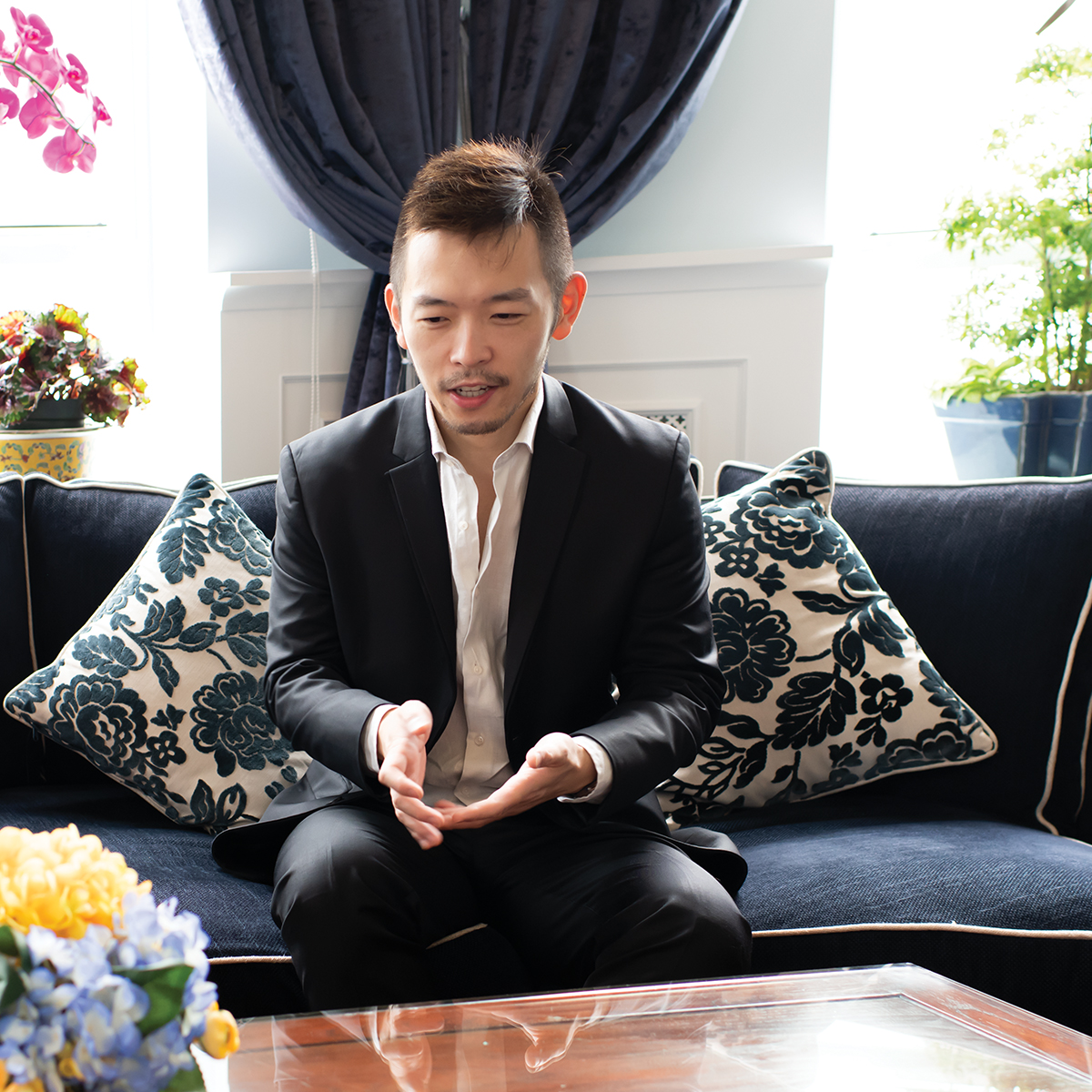
“Prof. Wille had a holistic approach to music: apart from teaching me piano repertoire, he would also discuss various religious or philosophical matters with me, and sometimes would even read me books on Arts!”
Prof. Wille was famous for his satirical writings1, and his sense of humour was not lost on Chun-Chieh. Chun-Chieh recounted, “I was once enamoured with Liszt’s Mephisto Waltz, so I asked Prof. Wille if he could teach me the piece.” In an episode of good-natured trickery, Prof. Wille proclaimed that the Mephisto Waltz was too difficult and, instead, handed him a ‘simpler’ piece – Balakirev’s Islamey. “So I just went ahead and learnt it.” It was only years later that Chun-Chieh would discover Islamey’s reputation for being ‘the hardest piece in the piano repertoire’.
First Taste of Fame
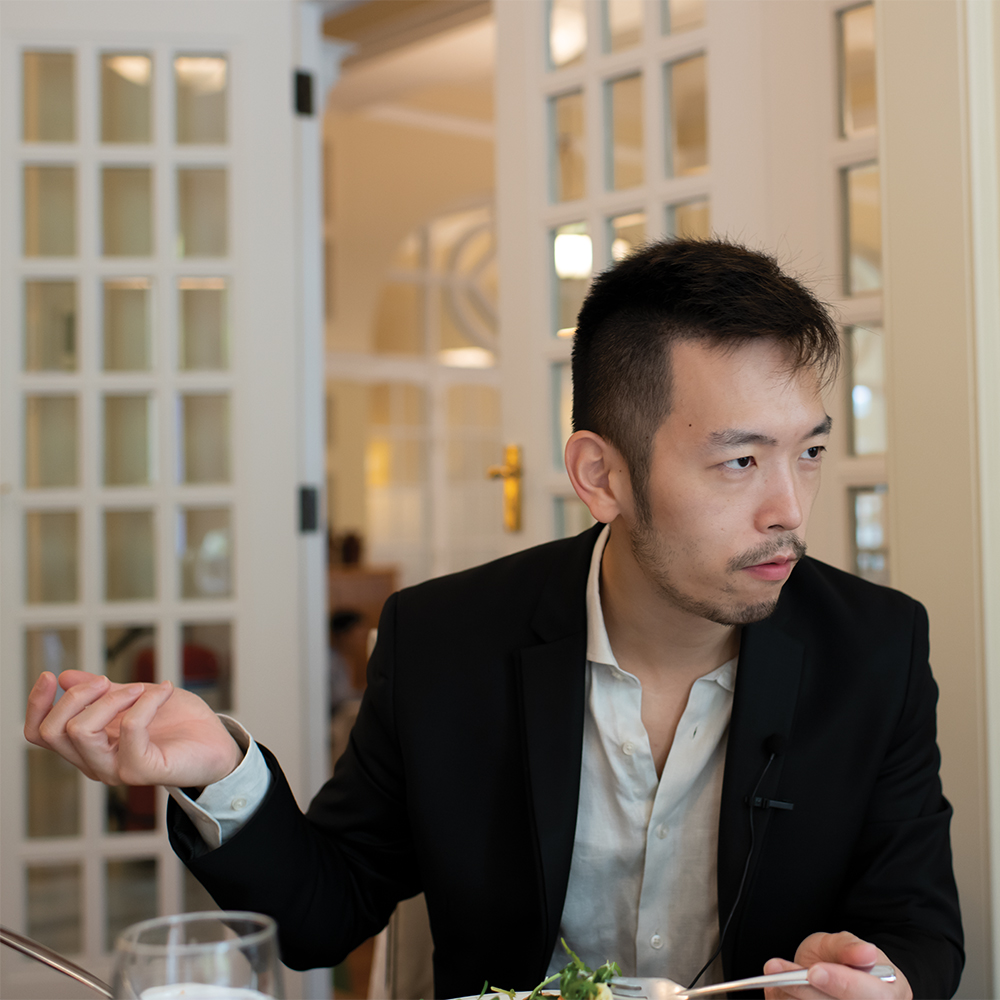
Chun-Chieh first rose to international fame at the age of thirteen. In 1997, he travelled to Saint Petersburg and took part in the Third International Tchaikovsky Competition for Young Musicians. “It was the biggest competition for pianists of our age,” he explained. “Lang Lang won the first prize two years before, and Ayako Uehara came second in that same competition.”
He won the third prize in the piano category: an unprecedented feat for a Taiwanese pianist trained locally at that time. “Before 1997, there were other Taiwanese award-winning pianists, but they were all trained abroad. I was the first pianist wholly trained under the Taiwanese music education environment, who competed with the world’s best pianists and won a prestigious international prize. It was big news for the Taiwanese society.”
And big news it was indeed. His success attracted the media’s attention, and they flocked to his school, trying to interview this piano prodigy. They even wrote a book on Chun-Chieh’s musical upbringing2. Shortly afterwards, he was invited to perform at Taipei’s National Concert Hall, making him the youngest pianist to make a recital debut at Taiwan’s most prestigious performing venue.
Chun-Chieh still remembered what he played at that time. “I was very ambitious. For the first half, I started with Liszt’s Variations on a Theme of Bach, Mendelssohn’s Variations sérieuses, Tchaikovsky’s Dumka, and finally Islamey. After all these, I played Prokofiev’s and Tchaikovsky’s piano concertos in the second half.”
Hannover and the Russian school
Chun-Chieh had not always wanted to be a professional pianist. In junior high school, he came first in various subjects in his form, and his parents naturally wanted him to become a doctor. “I didn’t want to meet patients all the time from morning till evening, so I told my parents this would never happen.” However, AIDS and HIV were just discovered back then, and he was enticed by the new diseases. “I wanted to do medical research, and I always dreamt that I would be the researcher who would find the cure to HIV.” Fortunately for us, the call of music was too great to resist, and he finally decided to become a professional pianist.
A career as a pianist isn’t easy to achieve, and Chun-Chieh knew that if he were to succeed, he would need to get more international exposure. But where should he go? His first thought was the Hochschule für Musik und Theater Hannover (University of Music and Drama Hannover). “My teacher, Prof. Wille, studied there before, under Karl-Heinz Kämmerling, so it was natural for me to go there. Plus, it was the best piano school in Germany.” In 1999, after graduating from junior high school, Chun-Chieh went to Hannover, Germany to further his musical studies under Vladimir Krainev.
Studying in a musical college was never easy, especially when it was under such an esteemed pianist. “Krainev, just like Ashkenazy, was also a first prize winner of the International Tchaikovsky Competition!” Brought up in Kharkov in northeastern Ukraine, Krainev entered the Central Music School in Moscow in 1959, studying under the pianist Anaida Sumbatyan, who also taught, amongst others, Ashkenazy and Yablonskaya.
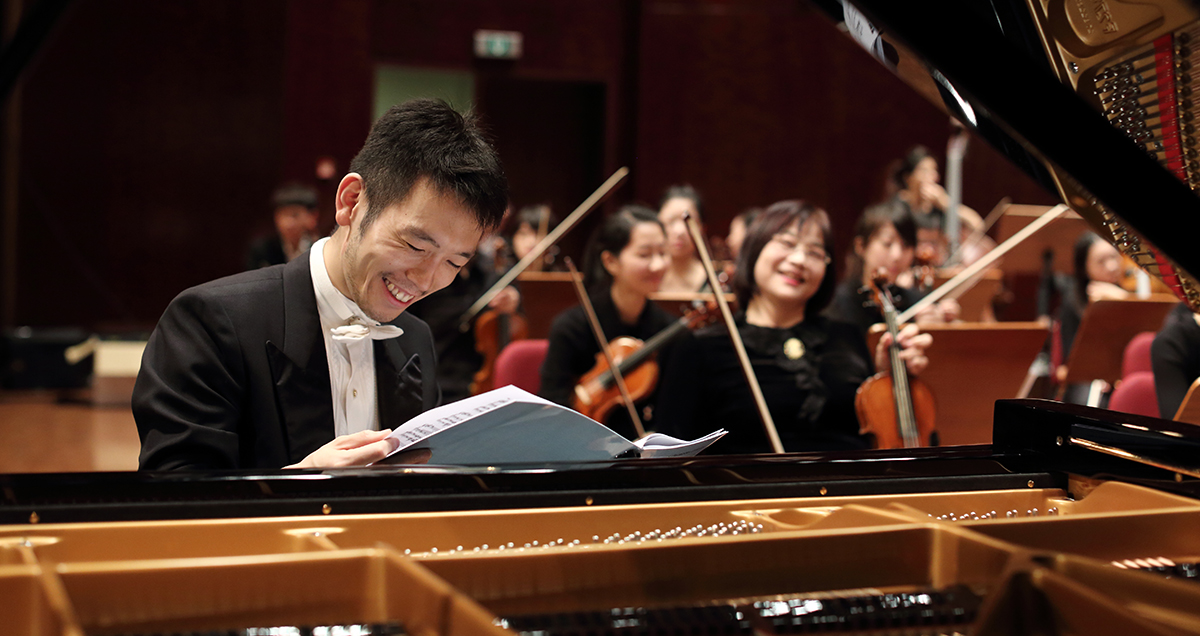
The premiere of Tchaikovsky’s Piano Concerto No. 2 in Taiwan (2014). Chun-Chieh Yen & the National Taiwan Normal University Symphony Orchestra.
The Cold War took place at that time. In 1958, Van Cliburn, an American, just won the first prize in the First International Tchaikovsky Competition in Moscow, and the Soviet government was very eager not to let that happen again, “So they asked Ashkenazy to join the Second International Tchaikovsky Competition.” Following Ashkenazy’s footsteps, Krainev entered the Fourth International Tchaikovsky Competition and won the first prize ex-aequo with John Lill, thus launching his career as a pianist.
In addition to being a great pianist, Krainev was also a caring teacher. “Krainev had a competition in Ukraine under his name, and he sponsored the winners to go to Hannover and study with him.” As a result, nearly all the students in Krainev’s classes were notable prize-winners. “When I heard that, I knew I had to practice like I never had to keep up with everyone!”
Chun-Chieh vividly remembered his first lesson with Krainev: “I was going to play Tchaikovsky’s concerto.” Having learnt the piece since the age of twelve, Chun-Chieh was so familiar with the piece that he could play it from memory. “But when I arrived at the studio, the first thing Krainev asked me was, ‘Why didn’t you bring your second pianist?’” Chun-Chieh was mortified, and things did not go well that day – he recalled, “He sat down and played as the second piano. But then he got very angry that my book kept closing itself and that I did not restudy the piece every time before I came to the lesson. And he just shooed me out of his studio.”
Thinking back, Chun-Chieh could understand Krainev’s impatience. Krainev was a student of Heinrich Neuhaus, and a firm advocate of the Russian school. “The most important thing for the Russian school is the imagination of the sound. They care a lot about the shaping of the melody and the balance between notes.” Chun-Chieh considered himself technically proficient when he entered Hannover. “After all, I won the Hamamatsu Academy Piano Competition in 1999! But when I studied under Krainev, I realised I didn’t have good sound control, nor a thorough understanding of phrasing.” The young Chun-Chieh often inadvertently accented notes in the melody, and Krainev would always pick that up. “Even if it was only one little accent, he would still stop me and make me correct it.”
Krainev would also stress about colours on different registers. “He was always displeased with the balance of my left and right hand, and he would always say I was playing too loud – but the pianos in Hannover were so bent that it was impossible for me to play pianissimo.” Chun-Chieh was amazed when Krainev proceeded to show his delicate pianissimo touch on the same piano. “He really can play!”
Chun-Chieh recounted other idiosyncrasies of his teacher. “Krainev was a man of few words. Supposedly, in a one-hour lesson, I would usually play for fifty to sixty minutes, and he would talk for three minutes. However, for the first four or five years, all he said was one word, ‘horrible’, or ‘empty’.” As Chun-Chieh matured, however, Krainev’s comments became increasingly positive. “When I was twenty-one, Krainev started saying ‘okay’ or ‘good’.” It was certainly a welcome change.
Chun-Chieh stayed for 11 years in Hannover, and during that time he was a frequent finalist or semi-finalist in international competitions. “Everyone in Hannover was entering competitions: it became a trend that was hard to ignore.” It was actually a situation of the chicken or the egg. “Many teachers in Hannover were heavily involved in international competitions, thus it was normal for pianists aiming for competitions to enter Hannover.” Throughout his studies, Chun-Chieh became classmates with many other familiar names, such as Yeol Eum Son, Yundi Li or Colleen Lee.
Practice
We asked Chun-Chieh what he thought about his younger self. “I know it is strange for me to say that … but when I reviewed my early performance videos, I discovered I didn’t have many fingering problems.”
He attributed this to self-motivation. “I was already very self-motivated since I was a child. When I was seven years old, I would wake up on the weekends at 6am and start playing the piano. In contrast, my parents would only wake up at 10am. Maybe that was why I always got first prize in Taiwan when I was young!”
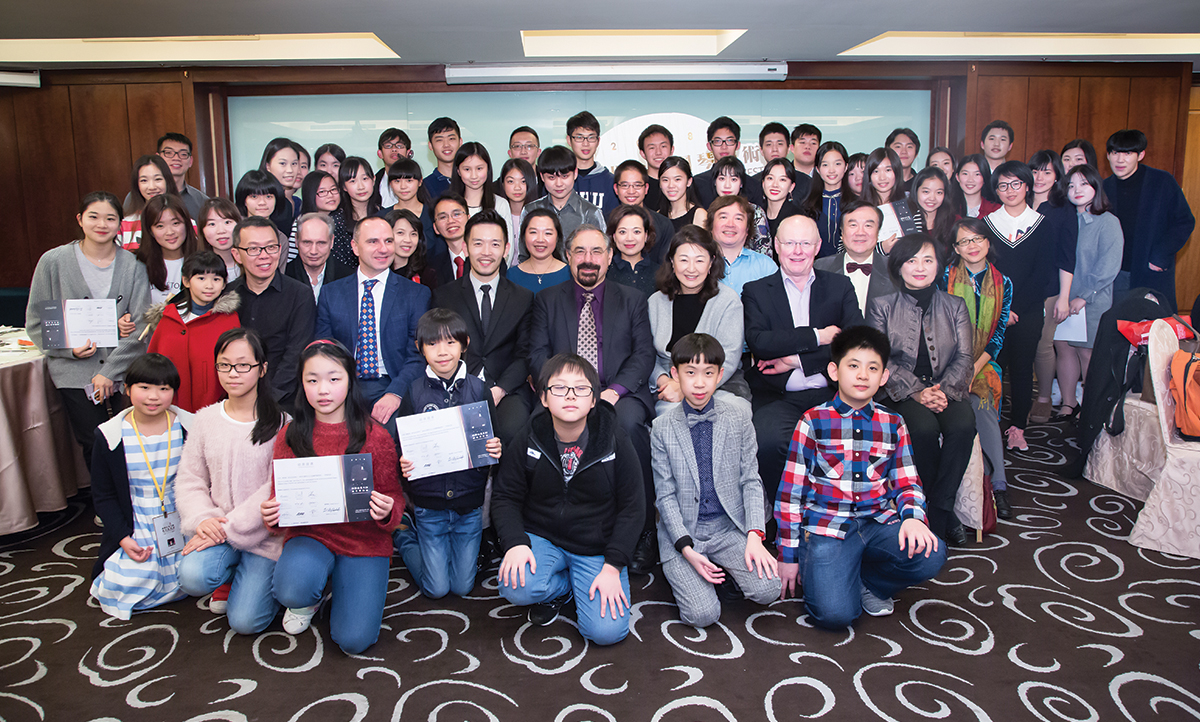
Teachers, staff and participants of the 2018 International Maestro Piano Festival.
Most kids of that age would be driven by the sense of pride and accomplishment from winning competitions, but for Chun-Chieh, the main motivation came from the music. “I would always listen to my own playing. I didn’t realise that at the time, but when I heard myself playing an ugly sound, or if I was not comfortable with my hands, I would stop and correct myself.” In contrast, piano students nowadays seldom do so. “They don’t play in sync with the piano, they use all the wrong muscles to produce a very ugly sound, and they don’t even care!”
When Chun-Chieh was in second grade, his teacher would give him the standard finger exercises, scales and Czerny, but Chun-Chieh didn’t play a lot of them. “I just played pieces, a few études, and then I jumped to those very difficult pieces.”
This mode of practice carried through in Chun-Chieh’s teaching. “For my younger students, I will usually give them one piece and one étude to work on, and the rest of the time will be music theory and basic training, focusing on things like weight training or the different approaches of fingers.”
For the more mature students, Chun-Chieh has another philosophy: “If your technique is already good, just play a lot. When I was in Hannover, I joined a lot of concerts, a lot of competitions, and generally practiced a lot. When you play a lot, you start to listen more, and you get to build up the appropriate vocabularies to express your emotions. Of course, having a teacher who is constantly pointing out your errors helps a lot too.”
Even after graduating from Hannover, Chun-Chieh hasn’t stopped improving. “I decided to challenge myself and programmed my performances serially. Between 2010 and 2012, I learnt and performed all the Chopin études and all the Debussy études, and played all of Tchaikovsky’s concertos in a row. It was the first of its kind in Taiwan.” Learning the pieces this way enabled Chun-Chieh to appreciate the works more. “It was the opposite of love at first sight. I remember I didn’t really like Debussy at first, but after I played through all the études, I was amazed by the different touches they commanded. He’s such a genius!”
Erhuang, Chen Qigang
In 2014, Chun-Chieh collaborated with the Taiwan Philharmonic to produce the first recording of Chen Qigang’s piano concerto, Er Huang3. We asked Chun-Chieh how the opportunity came about.
“The piece was already quite famous before I played it. In 2009, it was commissioned by Carnegie Hall, and Lang Lang premiered it with the Juilliard Orchestra in Lincoln Center. Jean-Yves Thibaudet also regularly played the concerto in his travels4. But Naxos wanted a recording of the piece, so they approached the National Symphony Orchestra in Taiwan, and asked them to suggest a pianist.” So, the Orchestra naturally nominated Chun-Chieh.
We asked Chun-Chieh what the recording experience was like. “It was scary! Chen flew to Taipei to supervise the recording, and it was the first time I had the composer standing next to me when I’m playing.” Chen was very specific on how the piece should be interpreted. “In some places, he would want me to be so quiet, but still maintain a smooth legato. There should be almost no motion, but at the same time you have to sing.” Fortunately, Chun-Chieh’s years with Krainev paid off, and Chen was very satisfied with the recording.
It also turned out Chen was not so scary after all. “There was a section with a lot of difficult jumps, just like in Liszt’s La Campanella, and I was worried I would play them wrong in the recording. But when Chen heard me playing that in the practice room, he dismissed my concerns, jokingly saying, ‘don’t worry, you played every note. It is already better than the others!’”
International Maestro Piano Festival
Returning to Taiwan after his overseas studies, Chun-Chieh felt something amiss in his home country. “I realised we never had a big international event in Taiwan.” There had been international competitions in Taiwan before, but most of them only lasted a few years before they were discontinued. “So I tried to come up with something persistent that has a connection with the international spectrum.”
It was with this vision that Chun-Chieh organised the International Maestro Piano Festival in 2017. “I invited all the big names and scheduled a week of workshops, masterclasses and lectures.” At the end of the week, concerts would be held: An All-Star Faculty Concert for the masters, and Promising Star Concerts that doubles as a competition for shortlisted candidates. “All students actually get to perform in the concert, but it will also be judged. After the results are announced, the winner of the concert will perform again, this time with the Taipei Symphony Orchestra.” It was indeed a fitting prize for a music festival.
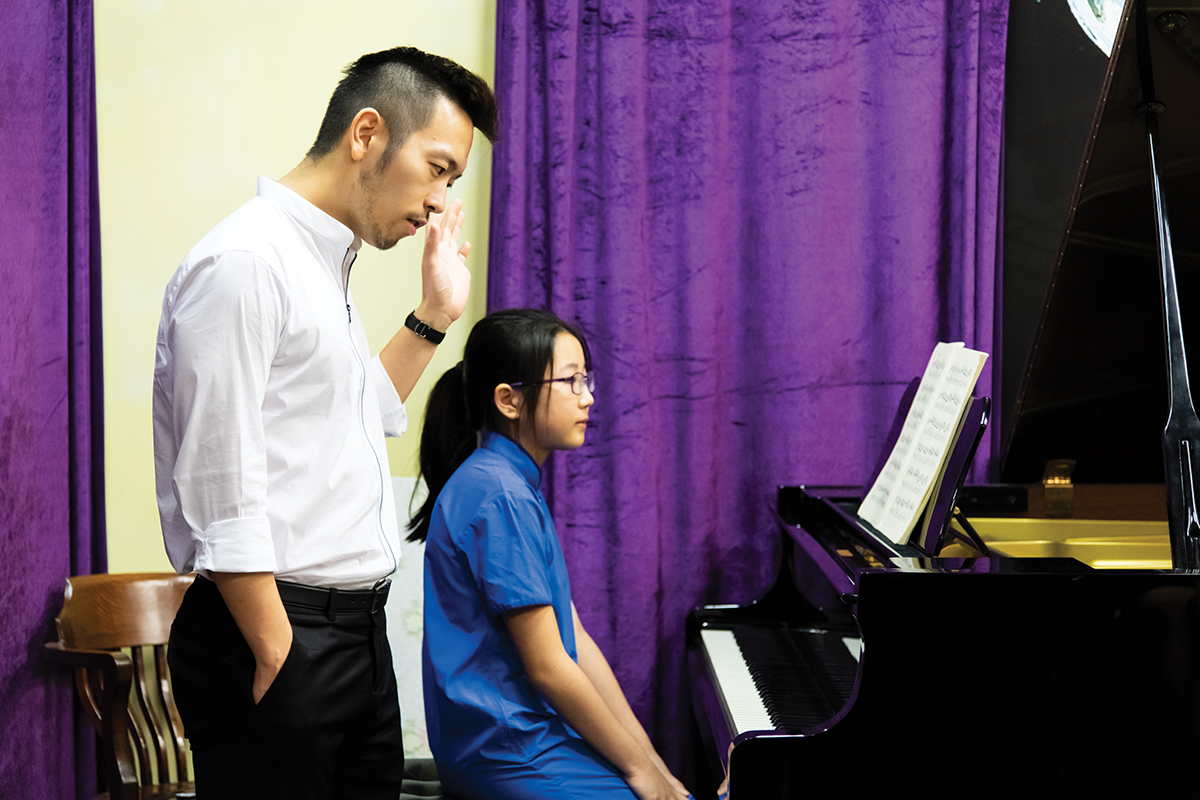
Chun-Chieh’s piano masterclass in Hong Kong (2018).
The first festival only had six teachers, but Chun-Chieh used quality to make up for the quantity, inviting prestigious musicians as Jerome Lowenthal, Pascal Nemirovski, John Parry, Matti Raekallio, and Ilane Vered. Needless to say, it was a huge success.
The festival expanded healthily since then. “For the second year, I decided to include at least one representative from every important school, so I invited Michel Beroff from Paris, Andrei Diev from Moscow, Boris Berman from USA, and many others around the world.”
Chun-Chieh envisioned a grander theme for the upcoming festival. “This year, the festival is not only for students, but also for teachers, and I invited different musicians to Taipei to talk about a huge variety of topics. For students, Robert Levine will be hosting a lecture, and Dang Thai Son will talk about ‘Singing on the Piano’. For teachers, there will also be talks about music education in different countries, and I invited Daejin Kim and Zhang Xinning to talk about the situation in Korea and in China respectively.” The aim of the festival, Chun-Chieh emphasised, is to create a platform for students to come out and learn, not to be a huge, glorified competition.
One hour passed by very quickly, and we met Chun-Chieh again in his piano masterclass that evening, where he coached budding pianists from the Young Musician Series. It is not easy to organise an ever-growing International Festival every year, and we wish Chun-Chieh all the best for his upcoming endeavors.
1His literary outputs include The Cold Smiling Piano (satirical short stories, 1988), How to Sabotage the Pianist (satirical short stories, 1991), Taipei Salad (satirical short stories, 1994), and Pianist: Wake Up and Dream! (2001).
21998年 鐘麗慧等著,《少年俊傑—MIT鋼琴家》 (The Young Chun-Chieh).
3The resultant recording was released in 2016, under the title CHEN, Qigang: Enchantements oubliés / Er Huang / Un temps disparu Naxos 8.570614.
4Jean-Yves Thibaudet was the pianist at the 2017 Hong Kong premiere of Er Huang, with the Hong Kong Philharmonic Orchestra.
[Interviewed by Cindy Ho, written by Chester Leung]
We asked if Chun-Chieh could offer us more insight into Krainev’s musical interpretations and piano teaching. In fact, he was asked about these already during an interview with Dr. YuanPu Chiao, a renowned music scholar, writer, music critic and TV presenter. The details were published in his book. Dr. Chiao and Chun-Chieh have kindly let Vantage translate certain passages into English and share them with our readers. Reader can access the translation through this link.

